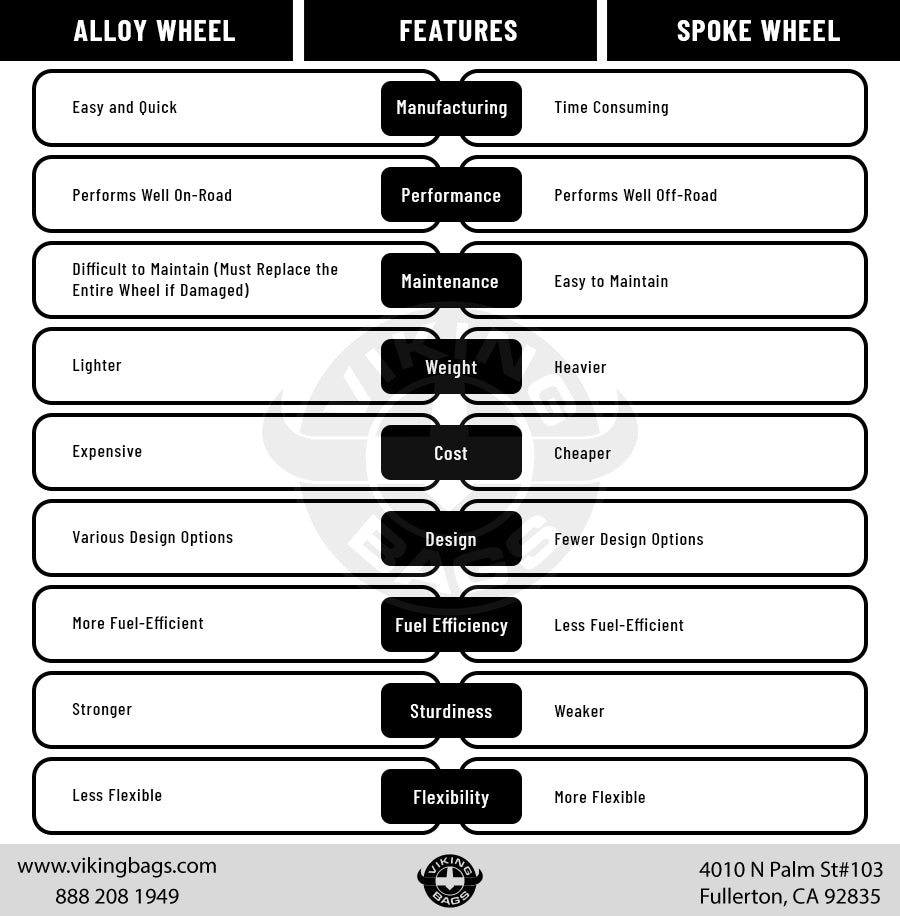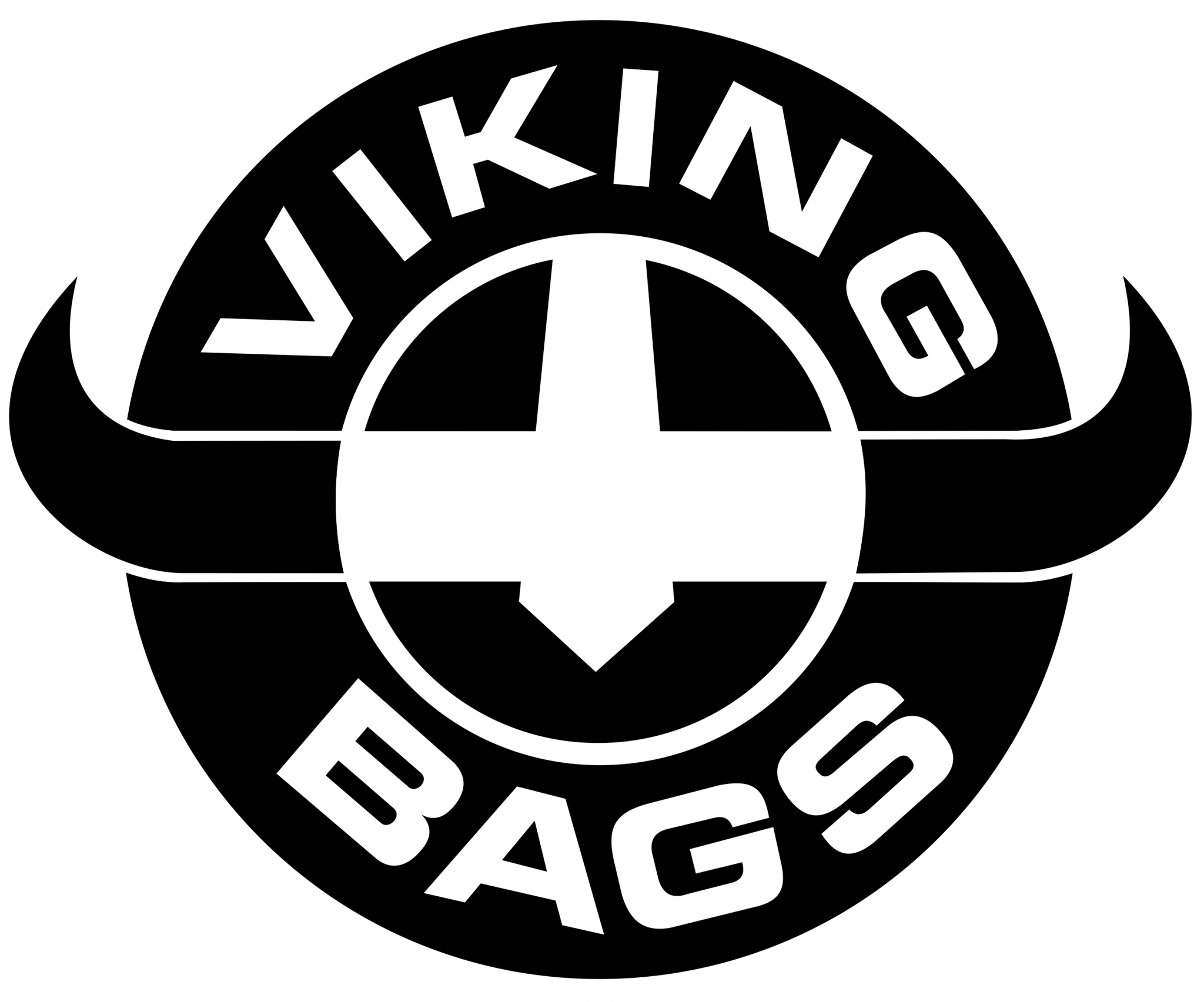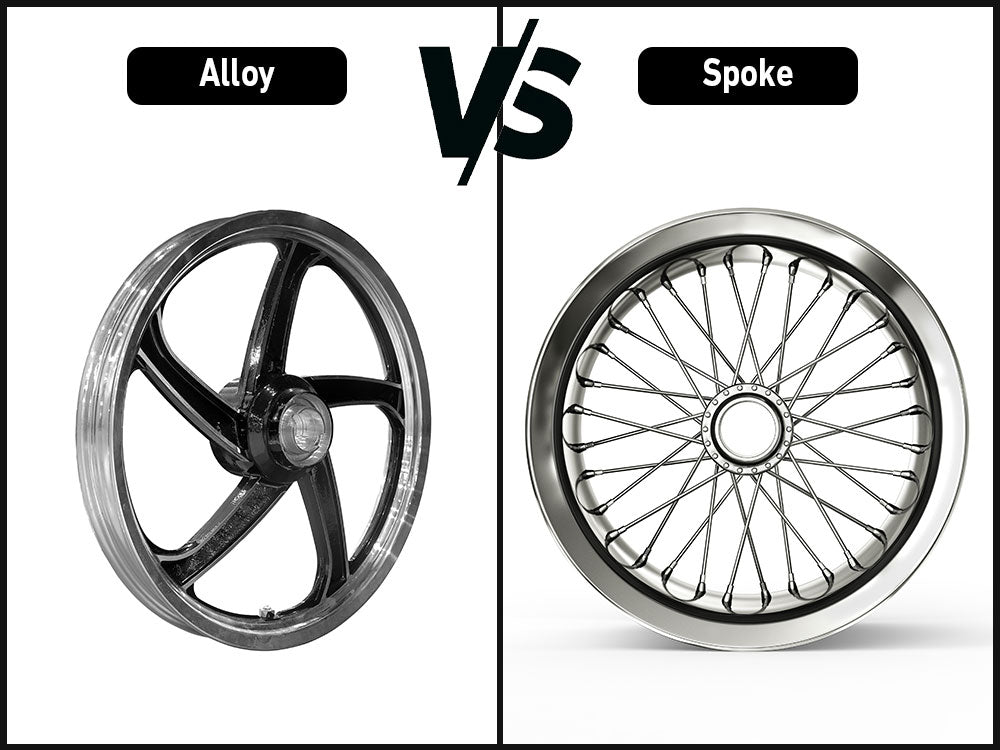Different types of wheels can impact the ride quality of a motorcycle. Alloy wheels are the modern versions created with metal forging and metallurgy. Spoke wheels are older versions often found on retro and classic vehicles. Alloy wheels have 4-5 solid bars, while the spoke wheels have several thin metal wires connected to the hub.
This article provides a detailed comparison between alloy and spoke wheels.
Table of Content

1. What are Alloy Wheels?

Alloy wheels are modern tubeless wheels that improve your motorcycle’s safety and performance. Being lightweight and easy to manufacture, alloy wheels are practical for traveling on paved roads. They are usually fitted on street bikes like naked bikes, sports bikes, and even scooters.
Alloy wheels are constructed from a combination of different metals, such as magnesium, aluminum, or nickel. After being heated, the melted alloy is poured into a wheel cast. The completed wheel can be removed from the cast after it has cooled down. This process is known as casting.
2. What are Spoke Wheels?

Spoke wheels have traditional designs that were primarily used before the 70s. These wheels are built with steel rims and spokes. The spokes are made of steel or similar metals and attached to the hub.
Spoke wheels are flexible and typically fitted on off-road vehicles, such as motocross bikes, dual sports bikes, ATVs, adventure bikes, and dirt bikes. These wheels can absorb heavy impacts and are highly robust due to the tension of each spoke. If the wheels need to be adjusted, the tension of each spoke can be adjusted to ensure they are properly aligned.
3. Alloy Wheels Vs Spoke Wheels
3.1 Manufacturing
Alloy wheels are often manufactured from an aluminum or magnesium alloy. Aluminum alloy wheels are cheaper, last longer, and are more durable. Meanwhile, magnesium wheels are lightweight, provide better mileage, keep the brakes from overheating, are less robust, and look more stylish
The magnesium wheels are also lighter and provide greater mileage than aluminum wheels. They also prevent brakes from overheating. They are less robust than aluminum wheels but have a more pleasing appearance. Some alloy wheels blend aluminum and magnesium to provide the best of both worlds.
Alloy wheels are classified into two types: cast alloy and forged alloy wheels. Cast alloy wheels are made using the casting process, in which molten aluminum is directly poured into a prefabricated mold and the shape is formed by a vacuum. When the wheel has cooled, it is taken out for cutting, drilling, and other changes.
Meanwhile, forged alloy wheels are more expensive due to being made by machinery that ensures better durability than casting. Forged alloy wheels are created from a billet, a single piece of metal that is heated and pressed to create its shape.
Wire-spoked wheels are constructed from steel and tend to be heavy. Spoke wheels have their steel spokes connected to the outer rim of steel or aluminum wheels. The manufacturing process for spoke wheels requires more involvement from designers. Despite the fact that alloy wheels are more prevalent, spoke wheels offer additional benefits that make them ideal for more types of motorcycles.
3.2 Performance
Alloy wheels are sturdy, rigid, and can handle high torque and horsepower. These single-piece wheels experience fewer vibrations which ensure better stability when cornering.
Meanwhile, spoked wheels are less rigid and more robust, making them ideal for motorcycles capable of off-roading. Spoke wheels are more flexible than alloy wheels and can withstand heavier impacts on uneven terrain.
Alloy wheels are best suited for riding on streets with smooth surfaces with little to no rough patches or uneven terrain.
Meanwhile, because spoke wheels are flexible, riding over bumps at high speed does not cause them to bend. Alloy wheels are ideally suited for on-road street riding where the wheels will not come into contact with any rough patches or huge pebbles.
3.3 Maintenance
Alloy wheels are difficult to repair if broken or deformed, often requiring you to get a replacement.
For spoke wheels, a damaged or dented rim can be repaired since replacing the inner tubes or individual wheel parts is easy and affordable.
3.4 Weight
Spoked wheels are heavier than cast alloy wheels. Cast alloy wheels add less to your motorcycle’s overall weight and ensure better handling on sports bikes.
Tubeless spoked wheels can help reduce weight if you ride large adventure bikes. When it comes to heavy-dirt motorcycles, this is the latest trend. Instead of puncturing the rim, they are created with a separate holding point. These tires reduce weight and allow you to get rid of the tube.
3.5 Resistance
The steel spoke wheels are more flexible, making make them more robust and resistant.
Meanwhile, alloy wheels have less resistance due to being more rigid.
3.6 Cost
Cast alloy wheels are more expensive due to the manufacturing process and high-quality materials.
Meanwhile, spoked wheels are mainly made of steel, a widely accessible material that results in a lower price.
3.7 Design
Alloy wheels are available in several different designs and colors.
Meanwhile, spoke wheels have a traditional design and are only available in a single color. With respect to design, alloy wheels are more attractive than spoke wheels.
3.8 Looks
The looks are closely related to the rider's preferences. Some people are fascinated with alloy wheels and prefer them for their bikes. There's also the other side that loves some gleaming spokes. Generally, spoked wheels look better on retro and adventure bikes. For a theme bike like a scrambler, it would be complemented best by spoked wheels. Based on personal preferences, it is possible to equip motorcycles with spoked or cast alloy wheels. If you want to improve the overall look of your motorcycle, you can install saddlebags, tank bags, crash bars, sissy bars, fairings, sissy bar bags, luggage racks, and handlebars.
3.9 Quality
Alloy wheels are made from sturdy and high-quality materials with a tubeless design.
Meanwhile, spoke wheels are of lower quality since they still have traditional tubes.
3.10 Fuel Efficiency
Alloy wheels are lightweight and put less pressure on the suspension, which improves fuel economy.
On the other hand, spoke wheels are heavy and have a lower fuel economy, resulting in more fuel being consumed.
3.11 Sturdiness
Alloy wheels are not as durable as spoke wheels, being more susceptible to cracks and dents.
Spoked wheels are stronger due to being supported by several spokes. The stronger grip makes spoke wheels better suited for off-roading and adventure tours.
3.12 Flexibility
Despite being lighter, alloy wheels are less flexible than spoke wheels due to their rigid structure.
Meanwhile, spoke wheels have metal spokes that offer more flexibility suited for off-roading.
4. Advantages and Disadvantages of Alloy Wheels
4.1 Advantages of Alloy Wheels
Can Use Tubeless Tires
Alloy wheels only have one hole to block airflow through the valve stem, making it easier to fit tubeless tires. Tubeless tires are easy to affix and have a low risk of a blowout.
Rigid
Alloy wheels are more rigid that ensure better stability at high speeds. That's the reason why all the superbikes have alloy wheels.
No Adjustment Needed
Once installed, alloy wheels don't need further adjustments or constant maintenance to keep them running.
Variety of Designs
Cast alloy wheels come in a variety of designs to better complement motorcycle looks and improve aerodynamics. You can also paint these wheels with different color schemes.
Lightweight
Alloy wheels are made of lightweight metals that result in less rolling resistance and better fuel efficiency.
4.2 Disadvantages of Alloy Wheels
Less Flexible
Alloy wheels are less flexible, providing less shock absorption when traveling over bumpy roads. This can cause discomfort for the riders and damage several motorcycle parts.
Can Become Imbalanced
The alloy wheels can become imbalanced if you hit a rock or a curb. Imbalanced wheels can cause more vibrations and increase the risk of an accident.
Not Suited for Off-Roading
Alloy wheels cannot handle rough terrain and perform worse on off-road trails due to becoming imbalanced.
Less Durable
Alloy wheels are less durable due to being made of softer and lighter metals. They may become unusable if they become bent or dented after traveling over bumps on the road while riding at high speeds.
Costly to Repair
If the alloy wheels break or bend, it is better to replace the wheel since it is more expensive to try and repair it.
5. Advantages and Disadvantages of Spoke Wheels
5.1 Advantages of Spoke Wheels
Cheaper
Despite manufacturing spoke wheels being more complex and labor-intensive, they are still cheaper than alloy wheels.
Easier to Repair
Most damage to spoke wheels can be repaired instead of having to replace the wheels entirely. You save money by having to replace the entire rib or hub. You can also make adjustments to the tension of the strokes.
Suitable for Rough Road Conditions
Spoke wheels are suited for bumpy or rough road conditions, making them useful for off-roading.
Durable
Spoke wheels are durable due to each individual spoke being able to withstand a lot of tension. When riding over challenging terrain, spoke wheels have the following benefits:
- Lateral: Controls side-to-side movements to keep the rider from falling off when leaning into a turn
- Radial: Prevents damage when the wheel hits a pothole
- Axial: Shifts braking and drive forces to the outer rim of the wheel
Flexible
Spoke wheels are flexible, capable of absorbing impacts when traveling over rough roads, pot holes, and debris to reduce damage. It protects the wheel from breaking by absorbing the impacts of hitting obstacles and holes.
5.2 Disadvantages of Spoke Wheels
Heavier
Being made of steel, spoke wheels are much heavier and can increase the weight of your motorcycle.
Less Fuel-Efficient
Due to their heavy weight, spoke wheels cause your motorcycle to suffer low fuel efficiency and less performance due to the air crossing spoke increasing air drag.
Requires Constant Maintenance
The metal spokes on the spoke wheels are constantly under stress and must be inspected and adjusted regularly. Any damaged spokes must be immediately replaced to reduce tension in the rim and avoid affecting the adjacent spokes.
Spokes are Difficult to Clean
Cleaning every single spoke can be tedious and tiring if you also want to polish them.
Instability at High Speed
Due to their flexibility, spoke wheels can lose stability at high speeds. However, there’s no such issue when riding at normal speeds.
Frequent Punctures
Due to several drilled holes circling around the rim of the spoke wheels, they require being fitted with tube tires. In case of a puncture, you must remove the tire before repairing the inner tube.
6. Alloy Wheels Vs Spoke Wheels: Which is Better?
Both alloy and spoke wheels have their advantages and disadvantages, no one is designed perfectly. If you are a professional motorcyclist searching for the best wheels for paved roads, choose alloy wheels. However, if you frequently go off-roading, spoke wheels would work best. Your choice of wheels depends on your riding style, habits, and the type of motorcycle you own.













Leave a comment
All comments are moderated before being published.
This site is protected by hCaptcha and the hCaptcha Privacy Policy and Terms of Service apply.